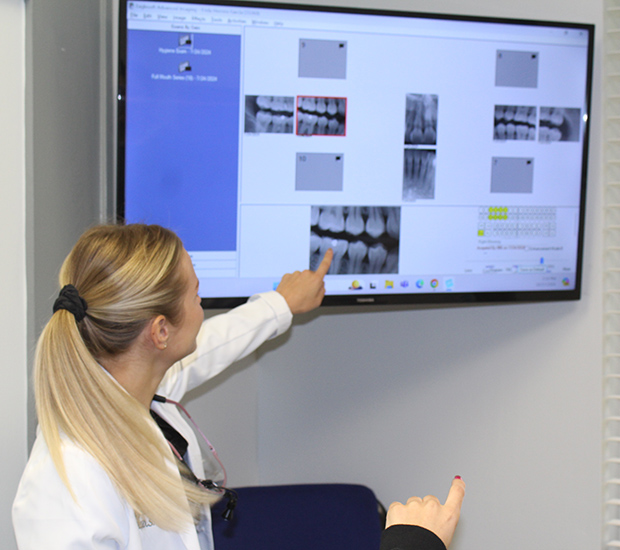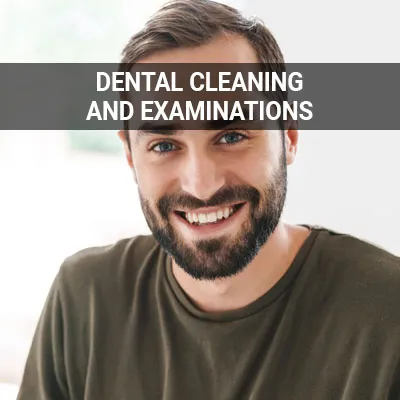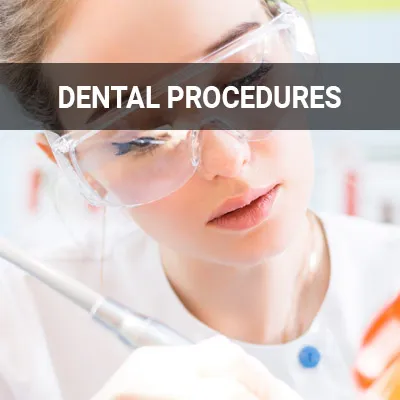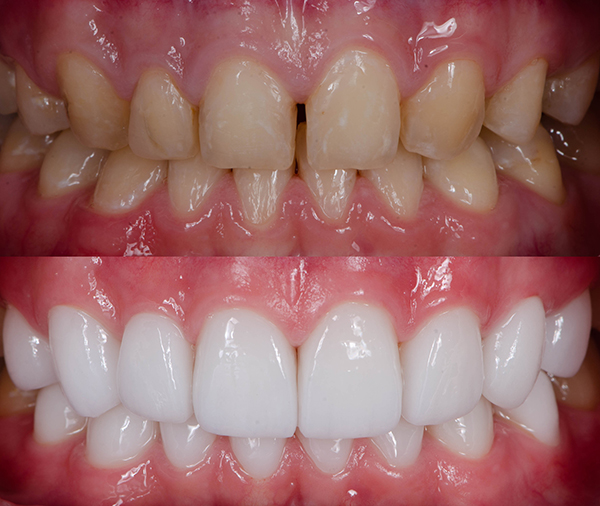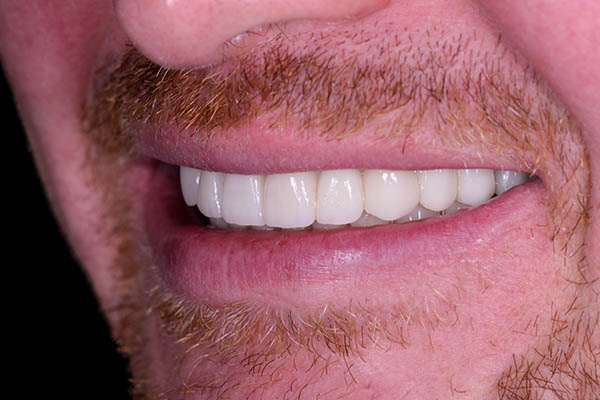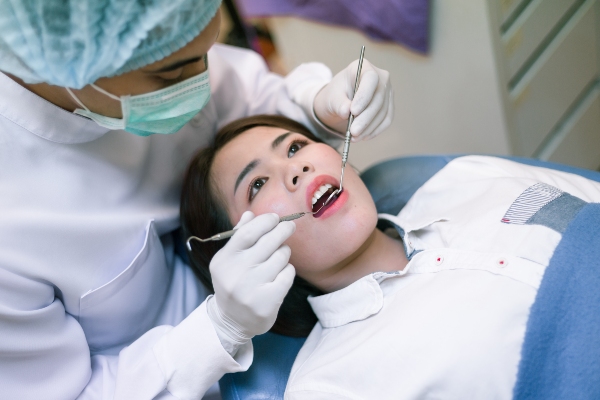Oral Hygiene Basics Port St. Lucie, FL
Beyond brushing your teeth twice a day, you might not think much about oral hygiene basics. However, the leading causes of tooth loss in older adults are gum disease and tooth decay, which are both caused by poor oral hygiene. Oral hygiene basics, such as proper tooth brushing and flossing, can help prevent these conditions and many other common dental problems.
Dental care is available at St Lucie Center for Cosmetic Dentistry in Port St. Lucie and the surrounding area. Contact us at (772) 242-4124 to schedule an appointment.
The Importance of Good Oral Hygiene
The teeth are connected to the jaw bone in the face through the tooth's roots. These roots are deeply ingrained in the bone to provide structure and strength to the mouth, which is important for biting, chewing, and speaking. Without an oral hygiene routine, the teeth risk the buildup of bacteria, otherwise known as tartar and plaque. This appears as a yellowish buildup on the teeth around the gum line.
Over time, if someone does not brush, floss, and rinse at home regularly and maintain their regular dental checkups, this buildup can start to affect the smile. If left alone, the bacteria can get beneath the gums and create dental pockets. These pockets occur when the gum tissue starts to pull away from the teeth. This may also cause gum recession, which may eventually expose the tooth roots. If the bacteria have access to the roots beneath the gum line, they may gain access to the body's bloodstream.
Once the bacteria can enter the bloodstream, the entire body may be at risk. Starting and following an oral hygiene routine will help prevent the buildup of bacteria and plaque on the teeth and keep the body safe. To protect the health of the smile is to protect the overall health of the body.
“To protect the health of the smile is to protect the overall health of the body.”
How to Properly Brush Teeth
The American Dental Association (ADA) recommends that people brush their teeth for two minutes at least twice a day. Brushing is crucial for removing plaque and bacteria buildup, which can both lead to gum disease and tooth decay.
Poor brushing is almost as bad as not brushing at all. In order to remove bacteria and plaque, teeth need to be brushed for at least two minutes. Take the time to move the toothbrush in gentle, circular motions, and make sure to clean all the surfaces of the teeth.
Proper flossing is also integral to a good oral hygiene routine. According to Healthline, patients should use 18 to 24 inches of dental floss, winding most of it around both middle fingers. Only about one to two inches of floss should be reserved for the teeth. Floss should be held taut between the thumbs and index fingers before being placed between the teeth. It should then be gently glided up and down. Patients should curve the floss at the base of the tooth, forming a C shape. A new, clean section of floss should be used for each tooth.
The mouth is full of bacteria. Proper brushing and flossing can keep these bacteria under control and keep them from causing any damage. But if hours or days pass between brushings, the bacteria can build up. When left in place too long, the bacteria start attacking the teeth.
“The mouth is full of bacteria. Proper brushing and flossing can keep these bacteria under control and keep them from causing any damage.”
Helping Other Family Members With Oral Hygiene
Children and seniors have special oral hygiene needs. Individuals with young children or older adults in their care may need to help them with their dental hygiene.
Oral Hygiene for Kids
Children will need help brushing their teeth until they learn to do it on their own. Start cleaning their gums with a clean, wet cloth before they have teeth to get them used to the routine.
When a child's first teeth start to appear, brush them twice a day with a child-sized toothbrush with soft bristles. Start flossing as soon as the child has teeth in contact with each other. This usually occurs around the ages of two and three.
Once children can hold a toothbrush, encourage them to brush their teeth. Watch them to make sure their teeth are being cleaned properly. To make brushing more fun, let them pick out a toothbrush featuring their favorite cartoon character. Make it into a fun family activity by brushing with them and playing a song.
Continue to supervise the brushing until they have adopted good oral hygiene habits.
Oral Care for Older Adults
Older adults are more likely to have special oral hygiene needs. A study published in the Journal of Prosthodontics found that dentures may negatively affect nutrition. They attribute this to denture wearers eating less nutritious food as a result of natural tooth loss. Several adults over the age of 65 have also experienced tooth loss.
Older adults are also likely to take multiple prescription and over-the-counter medications, increasing the likelihood of dry mouth. Dry mouth can increase the risk of tooth decay. Encourage older adults to brush their teeth regularly, drink plenty of water, and avoid alcohol, which can contribute to dehydration.
Older adults may also benefit from adding a fluoride rinse to their oral care routine to combat tooth decay. Adults with dentures may also need products designed specifically for denture care. For example, tartar can build up on dentures just as it does on teeth. Denture cleanser tablets are designed to keep dentures free of odor, stains, and bacteria, and many are safe for overnight soaking.
“Children and seniors have special oral hygiene needs.”
Check out what others are saying about our dental services on Yelp: Oral Hygiene Basics in Port St. Lucie, FL
How to Keep the Smile Healthy and Prevent Tooth Decay
Following a dental hygiene routine with at-home care and regular dental checkups will help keep the smile healthy and prevent tooth decay, but other things can be done as well. Certain foods and drinks, such as sodas and sugary sweets, can put the teeth at risk. The ingredients in these food items can attack the enamel on the teeth and weaken it, making them more susceptible to bacteria and decay.
Rather than eating and drinking sugary or acidic substances, everyone should try things like cheese, fruits, vegetables, and green and black teas. Cheese can combat erosion of the enamel, high-fiber fruits and vegetables can stimulate saliva production to help remove particles from the teeth, and certain teas combat bacteria that cause plaque. Plus, these healthy food items are good for the body, too, so while they are protecting the smile from tooth decay, they can give the body the nutrition it deserves.
“Following a dental hygiene routine with at-home care and regular dental checkups will help you keep the smile healthy and prevent tooth decay.”
Questions Answered on This Page
Q. Why is good oral hygiene important?
Q. How can a person's diet help with tooth decay?
Q. How can I properly brush and floss my teeth?
Q. What family members may need extra help with their oral hygiene?
Q. What are the best foods to eat to prevent tooth decay?
People Also Ask
Q. How often should someone have a dental checkup?
Q. Why is it important to find the right general dentist?
Q. How do lifestyle choices affect dental health?
Q. What is the importance of having a routine dental checkup?
Preventing Tooth Decay
In addition to regular brushing and flossing, other good habits that help prevent tooth decay include eating a healthy diet, drinking lots of water, and keeping toothbrushes clean.
Eat Foods That Promote Good Oral Health
Some foods can help clean teeth and fight plaque buildup. For example, fiber-rich fruits and vegetables can help keep teeth and gums clean. They also help increase the flow of saliva, which is important for washing away bacteria. In addition, saliva helps reduce the effects of the acids that attack teeth. It also contains trace amounts of the minerals calcium and phosphate, which can help restore areas of the teeth that have been damaged by acid.
Calcium-rich foods such as cheese and other dairy products can also help restore minerals into teeth. Also, drink black and green tea, as these contain compounds that inhibit the growth of bacteria in the mouth. Chewing sugarless gum can also help increase saliva production and help remove food particles from between teeth.
Keep Toothbrushes Clean
When finished brushing, rinse any residue off of the toothbrush. Set the toothbrush upright and allow it to air-dry. Keeping the toothbrush in a cabinet or enclosed container can promote bacteria growth. Replace the toothbrush every three months. Replace it sooner if the bristles become bent or frayed. If the bristles are bent, it could mean that the brushing is too hard.
Do not share a toothbrush with anyone. While sharing the toothbrush of a significant other might seem as harmless as kissing, health-wise, the two are very different. When kissing, it is mostly saliva that is shared. However, when sharing a toothbrush, bacteria and viruses from the other person are introduced into the bloodstream. This can be harmful to overall health, especially if the other person has gingivitis or gum disease.
“Limiting the consumption of sugary foods and drinks can help prevent tooth decay.”
Frequently Asked Questions
Q. Why are regular dental visits important?
A. Regular dental checkups can help identify minor dental issues before they become more serious. Treatment is likely to be simpler when problems are caught early. For example, when tooth decay and gum disease are treated early, they can often be reversed before significant tooth damage occurs. Untreated gum disease and tooth decay can lead to tooth loss and other major problems.
Q. Do I still need to see a dentist if I'm not having any problems?
A. Yes. Even if you are not experiencing any symptoms, you can still have dental issues such as tartar buildup and tooth decay. A dentist will be able to identify these issues before they become more serious.
Q. What are some signs that I should see a dentist?
A. If you experience swollen or sensitive gums, bad breath, pain or swelling in your mouth, difficulty chewing, or sensitivity to hot or cold foods, contact a dentist. These symptoms may be an indication of something more serious.
Q. Why are dental X-rays necessary?
A. Dental X-rays help dentists see tooth problems, including cracks and tooth decay, that are not visible to the naked eye. Expect to have X-rays taken if you have not been to the dentist in a while. Your dentist will take as few X-rays as possible to limit your radiation exposure. Let your dentist know if you are pregnant or may be pregnant, as pregnant women should not have X-rays taken.
Q. Is fluoride necessary for teeth?
A. Fluoride strengthens teeth while preventing decay. The American Dental Association (ADA), the American Academy of Pediatrics (AAP), and the Centers for Disease Control and Prevention (CDC) alike agree that children should use fluoride toothpaste for brushing. It also benefits adults.
Dental Terminology
Call Us Today
Before scheduling an appointment, be sure to make notes of any current at-home oral hygiene routines to be able to talk to the dental team about how to improve them. Scheduling an appointment and following through with dental checkups is a great start to a lifetime of healthy smiles.
When scheduling a dental appointment, take this time to make the dental team aware of any concerns and tell them if they need to take any steps to make the experience more enjoyable. To schedule an appointment, call us at 772-242-4124 today!
Helpful Related Links
- American Dental Association (ADA). Glossary of Dental Clinical Terms. 2024
- American Academy of Cosmetic Dentistry® (AACD). Home Page. 2024
- WebMD. WebMD’s Oral Care Guide. 2024
About our business and website security
- St Lucie Center for Cosmetic Dentistry was established in 1984.
- We accept the following payment methods: American Express, Cash, Check, Discover, MasterCard, and Visa
- We serve patients from the following counties: St. Lucie County
- We serve patients from the following cities: Port St. Lucie, River Park, White City, Fort Pierce, Fort Pierce South, St Lucie West, Tradition, Palm City, Jensen Beach, and Stuart
- Norton Safe Web. View Details
- Trend Micro Site Safety Center. View Details
Back to top of Oral Hygiene Basics
